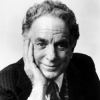David Amram

David Amram
David Amramis an American composer, conductor, multi-instrumentalist, and author. As a classical composer and performer, his integration of jazz, folkloric and world music has led him to work with the likes of Dizzy Gillespie, Lionel Hampton, Willie Nelson, Langston Hughes, Charles Mingus, Pepper Adams, Levon Helm, Betty Carter and Jack Kerouac. In the early 1950s, he was encouraged to pursue his unique path by mentors Charlie Parker, Thelonious Monk, the New York Philharmonic's conductor Dimitri Mitropoulos, Miles Davis, Aaron Copland,...
NationalityAmerican
ProfessionComposer
Date of Birth17 November 1930
CountryUnited States of America
Morley is one of the outstanding voices of her generation, as a singer, songwriter and bandleader she's in a class of her own, transcends all categories and is making a major contribution to contemporary music.
In a jazz atmosphere, the audience members were so quiet and respectful of the musicians that you felt you were almost part of a meeting at a church or a temple, where everyone was completely in tune with the sermon and what the whole event was about.
The first time I heard Ron Whitehead read I felt what I imagine those who heard Abraham Lincoln deliver The Gettysburg Address felt.
Esquire, in a July, 1957 issue, has a photograph of me playing the French horn at the Five Spot.
Today's trend ends up in tomorrow's landfill.
We met with the poet Frank O'Hara, who was a link between Upper and Lower Bohemia, and who worked at the Museum of Modern Art, where we had hoped to do the readings.
The atmosphere was wide open in those circles that we traveled in.
Franz Kline, who became known for his black and white paintings, did a whole series of gorgeous landscapes and wonderful portraits that may still hang in Greenwich Village.
Allen Ginsberg was a world authority on the writing of William Blake, and had an incredible knowledge of classic literature and world politics.
Lawrence Ferlinghetti had a tremendous education as an artist and also an enormous knowledge of literarture.
I learned from my uncle that jazz, like symphony music, was built to last.
A few years later, my Uncle David took me to the Earle Theatre to hear Duke Ellington.
In symphonic music, when you are conducting, you do the same thing. You are feeling the whole orchestra, thinking ahead so you can prepare for a change.
In jazz, you listen to what the bass player is doing and what the drummer is doing, what the pianist and the guitarist is doing, and then you play something that compliments that, so you are thinking simultaneously and thinking ahead.